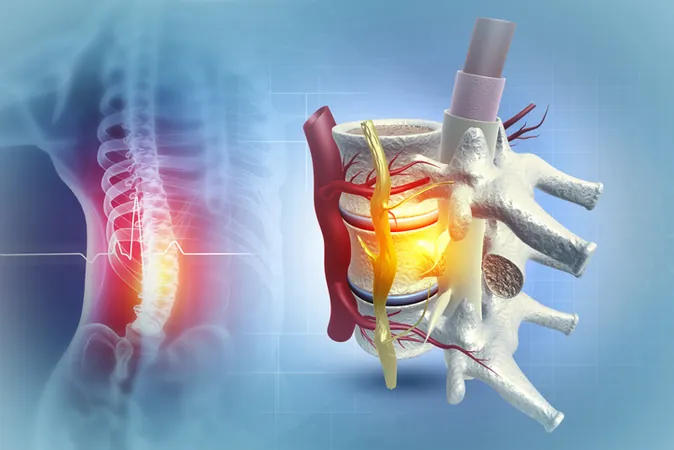
Revolutionary Bioelectric Implant Transforms Life for Spinal Cord Injury Patients
2025-09-18
Author: Arjun
A Breakthrough in Blood Pressure Management for SCI Patients
When Aaron Phillips, PhD, witnessed the struggles of a close friend with a spinal cord injury (SCI), he became determined to tackle the issue of blood pressure instability that plagued him. This condition is more than just a minor inconvenience; it can lead to dizziness, blurred vision, and even fainting. Phillips, now an associate professor at the University of Calgary, spearheaded a pioneering project that offers hope to those suffering from this debilitating side effect of SCI.
The Burden of Blood Pressure Instability
Blood pressure variability is a significant yet often overlooked issue for many SCI patients, drastically impacting their quality of life. Current treatments like compression stockings and increased salt intake often fall short, leading to increased risks of stroke and heart disease, along with a diminished sense of independence.
The Game-Changing Implantable Device
In collaboration with an international team of researchers, Phillips developed an innovative implantable neurostimulation device. This biomimetic epidural electrical stimulation (EES) device mimics natural signals in the body, sending gentle pulses to a targeted area of the spinal cord. This groundbreaking study, recently published in *Nature Medicine*, opens up the pathway for larger clinical trials aimed at helping those suffering from dangerously low blood pressure.
Scientific Studies Back the Breakthrough
Phillips previously revealed that this technique can stabilize blood pressure effectively. The team, led by French neuroscientist Gregoire Courtine, also published a complementary study outlining how precisely targeted EES can combat low blood pressure, validating their approach with compelling clinical evidence.
Understanding the Magnitude of the Problem
With harsh statistics showing that 78% of individuals with tetraplegia struggle with orthostatic hypotension, the scientific community recognizes the urgent need for solutions. In a survey of SCI patients, nearly all reported continuous symptoms related to blood pressure instability. This underlines the pressing requirement for innovative therapies despite the need for surgical intervention.
Targeting the Hemodynamic Hotspot
Building on extensive research, the team pinpointed the lower thoracic spinal cord as the most effective area for stimulation. In trials with six volunteers experiencing severe blood pressure issues, EES targeted at this hotspot consistently stabilized their condition without painful side effects.
A Real-Time, Closed-Loop System
Unlike previous devices designed primarily for pain management, the new implant is specifically engineered for blood pressure control. A wearable hub communicates with the device, adjusting the stimulation in real time to maintain optimal blood pressure levels.
Remarkable Patient Outcomes
In early clinical studies, participants showed immediate and sustained improvements in blood pressure stability. Many halted other treatments and reported enhanced quality of life. The therapy not only stabilized their condition but also drastically reduced experiences of dizziness and other distressing symptoms over time.
A Brighter Future for SCI Patients?
With promising results in hand, Phillips and his team are now preparing for larger clinical trials that could revolutionize treatment for SCI patients struggling with blood pressure issues. They stress the importance of regulatory approval to unlock this innovation for global patients, potentially restoring normalcy and confidence in their daily lives. This could mean a seismic shift in the care of those who suffer from not only SCI but the overwhelming effects of uncontrolled blood pressure.
The Next Steps
With the backing of ONWARD Medical, the team is determined to verify their findings on a larger scale. If successful, this therapy could offer not just symptom relief but a significant enhancement in the overall quality of life for SCI patients.


 Brasil (PT)
Brasil (PT)
 Canada (EN)
Canada (EN)
 Chile (ES)
Chile (ES)
 Česko (CS)
Česko (CS)
 대한민국 (KO)
대한민국 (KO)
 España (ES)
España (ES)
 France (FR)
France (FR)
 Hong Kong (EN)
Hong Kong (EN)
 Italia (IT)
Italia (IT)
 日本 (JA)
日本 (JA)
 Magyarország (HU)
Magyarország (HU)
 Norge (NO)
Norge (NO)
 Polska (PL)
Polska (PL)
 Schweiz (DE)
Schweiz (DE)
 Singapore (EN)
Singapore (EN)
 Sverige (SV)
Sverige (SV)
 Suomi (FI)
Suomi (FI)
 Türkiye (TR)
Türkiye (TR)
 الإمارات العربية المتحدة (AR)
الإمارات العربية المتحدة (AR)